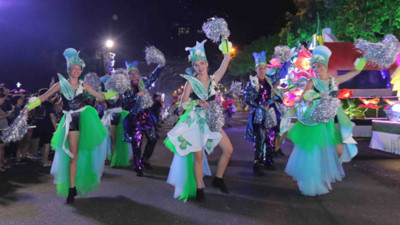 |
| Francisco de Pina who is believed is the inventor of the Vietnamese-romanised script. File Photo |
The city's culture authority has held a public survey for a project on naming nearly 140 streets, roads and public buildings in the city in 2019.
Among the name suggestions, there are the two missionaries, Francisco de Pina (1585-1625), a Portuguese priest, who arrived Vietnam in 1617 and invented the Vietnamese alphabet, and Alexandre de Rhodes (1591-1660), a French missionary as well as lexicographer, who wrote the first trilingual Vietnamese-Portuguese-Latin dictionary.
Two streets in the city’s Hai Chau District are expected to be named after the missionaries.
According to the director of the city’s Department of Culture and Sports, Huynh Van Hung, the two men played significant roles in the formation of the present Vietnamese script.
"The founding of the modern Vietnamese-romanised script has boosted Vietnamese culture incredibly. Their names were suggested by historians and cultural researchers,” he said.
Next month, the Da Nang Association of Science and History will hold a workshop on the theme "A Hundred Years of Vietnamese-Romanised Honouring". Speakers will present their reports on the contributions of de Pina and de Rhodes.
Other figures who have contributed to the country are also being considered. They include Mother Suốt (1906-1968), who, in the anti-American War, rowed her boat to carry hundreds of Vietnamese soldiers to cross the Nhat Le River in Quang Binh Province during 1964-67; Armed Forces Hero Vu Xuan Thieu (1945-1972); writer Nguyen Dinh Thi (1924-2003); and People’s Artist Nguyen Van Thong (1926-2010).
The project on naming Da Nang streets, roads and public buildings in 2019 is expected to be submitted to the city’s People Committee next month.
In HCM City, a street in District 1 has been named after Alexandre de Rhodes.
The Vietnamese writing system was initially romanised to allow Catholic missionaries to transcribe scriptures for locals.
In 1617, Francisco de Pina began his mission in Cochinchina (today the southern provinces of Vietnam) where he became the first foreigner to master Vietnamese and preached without translators. This success had enabled him to develop a bond with local people, which helped him to boost his teaching and carry on his missionary work.
 |
| The Mang Lang Catholic Church in An Thach Commune, Tuy An District, Phu Yen Province where keeps the first Vietnamese-romanised book by French priest Alexandre de Rhodes. Entitled in Latin as ‘Catechismus’, the Latin-Vietnamese bilingual book was printed in Roma in 1651. — Photo: VNE |
De Rhodes wrote the first trilingual Vietnamese-Portuguese-Latin dictionary in Vietnam. The dictionary was published in 1651 in Rome with the name Dictionarium Annamiticum Lusitanum et Latinum. His publications laid down the groundwork for Vietnamese-romanised script or quốc ngữ (national language), which is universally used today.

Street carnival whips up excitement among Da Nang crowds
A street carnival held on the streets of Da Nang during the international fireworks festival on June 9 saw thousands of local people and tourists enjoy the enthusiastic displays on show.

Da Nang set to provide visitors with 'sleepless' beach experience
The Da Nang city People's Committee have unveiled plans to offer visitors a ‘sleepless’ beach experience that features a wide range of entertainment activities.
VNS
 Authorities in the central city of Da Nang are considering naming some streets in the city after two foreign missionaries, who play key roles in the development of the Vietnamese-romanised script.
Authorities in the central city of Da Nang are considering naming some streets in the city after two foreign missionaries, who play key roles in the development of the Vietnamese-romanised script.